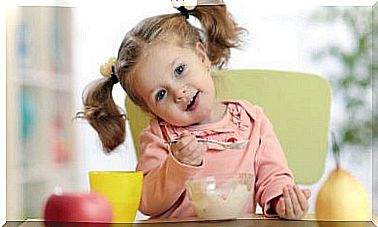Should We Add Salt To Children’s Food?

Salt is one of the best flavor enhancers in the world. It makes culinary preparations more tasty. But should we add salt to children’s food? The truth is that adding salt to children’s food is unnecessary and potentially dangerous.
During childhood, it is best to create good eating habits that can be maintained in the future. Therefore, it is important to provide the child with the necessary nutrients for its growth and avoid the elements that are harmful to health.
We do not need to add salt to create a balanced diet
The first thing to understand is that salt consists primarily of sodium. This mineral is very important for human health – but in the right amount.
Sodium is naturally present in foods, so it is unnecessary to add salt to meals and it increases the intake significantly. Exceeding the recommended limit for this mineral can cause damage to health.
However, there are contexts where salt intake is recommended. Eg. for athletes after intense activity. This is because the body loses copious amounts of sodium through sweating and needs to be replaced.
However, this cannot be directly transferred to children’s diets, as the amount of sodium that children get through food is sufficient for their body. As with many other nutrients, the needs of this mineral in childhood are very different from the needs of adulthood.

Why is it not good to add salt to children’s food?
If possible, avoid adding salt to children’s food.
For many years, experts have claimed that this element could cause high blood pressure in the medium and long term, according to a study published in the journal Nutrients .
However, the latest research claims that the link between salt intake and blood pressure is not quite as clear. High blood pressure may be due more to genetic predisposition and changes in the microbiota than sodium intake.
The reason why one should not add salt to children’s food is related to the need to accustom their palates to the right taste of food. This promotes the incorporation and maintenance of good eating habits.
You also need to keep your sugar intake under control!
In addition to limiting salt intake , it is important to avoid adding sugar to children’s food. This ingredient can adversely affect their body function because it promotes intestinal inflammation and increases blood sugar levels.
Regular intake of sugar in the early stages of life is associated with an increased risk of developing obesity and type 2 diabetes. Therefore, it is important to use it sparingly and avoid it whenever possible.
Also pay special attention to the nutrition declarations. Many products for general consumption have hidden sugar in them, even if it is not apparent from the taste. An example is ketchup or wrapped sliced bread.
Therefore, it is important that you carefully review the ingredients in the foods you buy in the supermarket before offering them to children.
It is a good habit not to add salt to children’s food!
As you have seen, the best solution is to avoid the use of salt as an ingredient in children’s food. And if you still need to use salt in your preparations, do so in moderation unless your doctor tells you otherwise for special health reasons.
With this strategy you can get the little ones used to the right taste of the food, which is a really good habit from a nutritional point of view. The food industry often offers products that are too tasty and counterfeit, that contain harmful substances or quantities that are inappropriate for health.
Lastly, do not forget to limit your intake of simple sugars. Always check the labels to make sure that this ingredient is not present in the food you offer your children.








